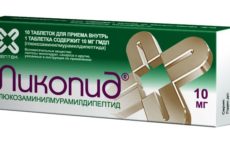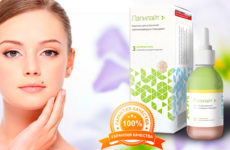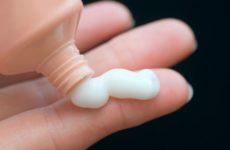Содержание:
- 1 Introduction
- 2 Composition and form of release of a children’s drug
- 3 Operating principle
- 4 Indications for use
- 5 From what age can it be used, is it prescribed for infants and newborns, a child under one year old?
- 6 Recommendations for the use of different forms of drugs
- 7 The consequences of an overdose on the health of the child
- 8 Contraindications and side effects
- 9 Interaction with other drugs
- 10 Shelf life and storage conditions
- 11 Terms of dispensing from pharmacies
- 12 special instructions
- 13 Means analogues
- 14 Reviews about the drug
- 15 Conclusion
Introduction
In every house where a child grows up, the first-aid kit should contain the drug Interferon and instructions for it.
It prevents the reproduction of viruses and helps the baby fight diseases. Especially important is the use of the drug for prophylactic purposes after contact with patients.
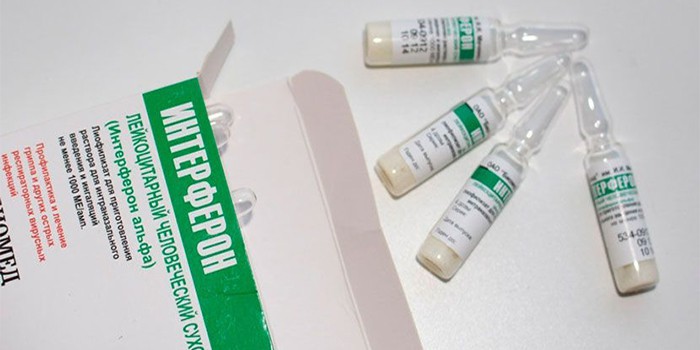
Composition and form of release of a children’s drug
The composition of Interferon includes the following components:
- leukocyte interferon (natural human);
- sodium chloride;
- a mixture of sodium dihydrogen phosphate and dihydrogenate;
- starch (meets potato and corn);
- alcohol;
- auxiliary ingredients (flavoring additives and fragrances).
The medication for children is available in the following forms:
- a drop in the nose;
- solution for inhalation;
- suppository;
- ointments;
- tablets.
Operating principle
The main component of the drug is interferon. It has the following properties:
- inhibits the synthesis of viruses;
- activates cellular enzymes that are aimed at delaying the production of protein molecules of the virus;
- synthesizes a protein that causes the death of affected cells;
- stimulates the protective functions of the body.
Indications for use
The drug Interferon is able to fight many viruses and bacteria. The scope of the drug is wide, it is used to treat such diseases:
- viral diseases – in this case, solutions for inhalation and ointments in the nose are more often used;
- diseases of the mucosa (inflammatory nature) – ointment is also used here;
- systemic diseases (for example, herpes zoster or multiple sclerosis);
- viral diseases that affect internal organs (hepatitis);
- oncological diseases;
- some diseases of the visual organs (conjunctivitis).
From what age can it be used, is it prescribed for infants and newborns, a child under one year old?
Interferon can be used to treat newborns and infants. Most often, candles and nasal drops are used for this. These methods of therapy are the most acceptable, since in these cases the components of the drug do not enter the digestive system.
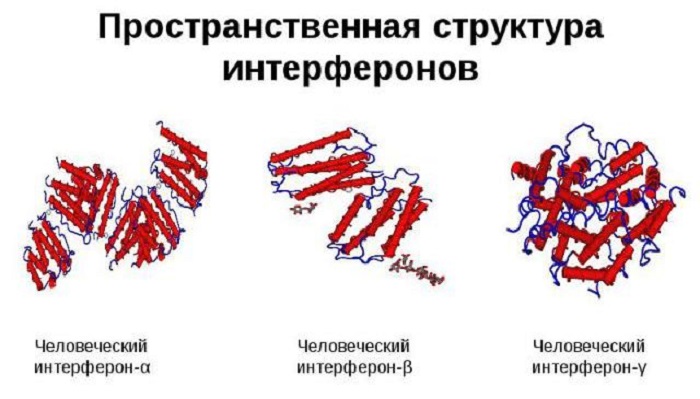
Recommendations for the use of different forms of drugs
In order not to harm the health of the baby, you need to know the rules for using the medicine.
How to apply nose drops
This form of medicine is intended for the treatment and prevention of viral diseases. Before use, the drug is diluted with water (boiled or distilled) to the mark – you need to pour 2 ml. With the right dilution of the mixture, it will become transparent (sometimes with a slight yellow tint).
For prevention, drops are used twice a day for 5 drops with a minimum break of 6 hours. The duration of the course is set by the pediatrician. For the treatment of viral diseases, drops are used every 2 hours (5 drops each). The course of treatment is no more than three days.
Drops have an immediate effect, but it will be minimal. The visible effect will be noticeable after 2 days of therapy.
For the treatment of infants, drops are applied to a cotton swab and placed in the nasal passage. The nose is first cleansed with salt water.
Recommendations for the use of candles
Put suppositories twice a day (morning and evening) – one at a time. Duration of treatment – 5 days.
Candles are available in different dosages, they are selected in accordance with the age of the child. In rare cases, local irritation may occur. If the five-day course did not bring the desired result, it can be repeated after a few days.
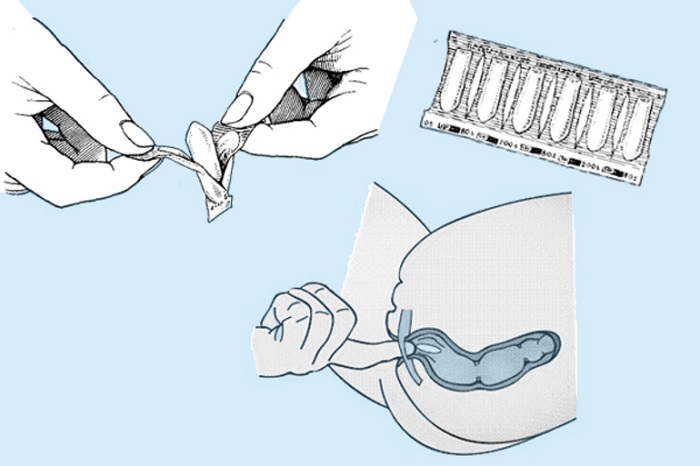
Interferon ointment – recommendations for use
The ointment protects the baby from the negative effects of viruses and bacteria. The drug is applied to the nose twice a day – every 12 hours. Pediatricians recommend applying the ointment immediately after waking up the child and before going to bed.
You can use the ointment as an additional therapy for a crescent. For preventive purposes, the ointment is used for a month three times a week.
How to dilute liquid in ampoules for inhalation?
Interferon in ampoules is used for the preparation of inhalations – their effectiveness is much higher compared to other forms of medication. For one inhalation, take 3 ampoules and dilute them in 10 ml of pure water.
Inhalations are carried out through the nose or mouth twice a day.
Pills
This form of medication is prescribed extremely rarely. If the tablets are prescribed, then the dosage is calculated in the amount of 2050 IU for each kilogram of the child’s weight.
The consequences of an overdose on the health of the child
Often an overdose of Interferon does not appear, but sometimes the following side effects can be observed:
- allergic manifestations in the form of a rash or itching;
- malfunctions of the heart (arrhythmia, pressure surges);
- nausea, vomiting;
- dizziness;
- convulsions;
- overexcitation, sleep disturbance;
- pain in the muscles;
- constipation or diarrhea.
If any of these side effects occur, contact your doctor immediately.
Contraindications and side effects
Interferon is a safe drug, it will not harm if you follow all the recommendations and instructions. The medicine can not be used to treat children in the following cases:
- violations of the heart;
- diseases of the central nervous system;
- deviations in the functioning of the kidneys and liver;
- allergy to the components of the drug;
- ailments of the thyroid gland.
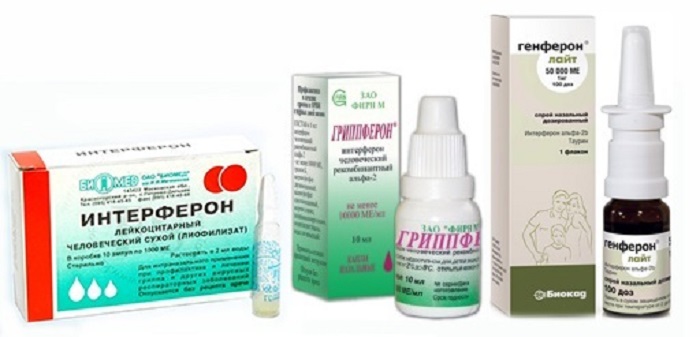
Interaction with other drugs
The drug does not actively interact with other medicines. However, Interferon has the ability to enhance or weaken the effects of antibiotics. Pediatricians do not advise treating a child with Interferon at the same time as paracetamol.
Also, you can not take the medicine together with ethanol and immunosuppressants, since Interferon enhances the neurotoxic effect of previously taken drugs. In any case, before using the drug in conjunction with other drugs, you should consult a doctor.
Shelf life and storage conditions
Interferon in any form of release is stored in the refrigerator at a temperature of 2-8 degrees, while it is important to ensure that sunlight does not fall on the medication. It is worth extracting the medicine only immediately half an hour before use.
Форма выпуска Срок хранения до вскрытия Срок хранения после вскрытия Таблетки 24 месяца 30 дней Суппозитории 12 месяцев 2 недели Раствор 24 месяца сутки Порошок 24 месяца 30 дней Мазь 12 месяцев 2 недели
After the expiration date, the interferon breaks down, and the medication becomes useless.
Terms of dispensing from pharmacies
You don’t need a doctor’s prescription to buy Interferon.
special instructions
Viral infections that are at an early stage of development are best treated with ointments that contain a minimal amount of the active substance. Also, this form is recommended to choose for the prevention of diseases.
The ointment is not recommended to be used if it smells of bitter oil, it is also worth abandoning the therapy if the package is not tight.
Means analogues
The active substance interferon is contained in the following preparations:
- Alfaferon .
- Wellferon.
- Interlock.
- Grippferon.
- Infagel.
- Inferon.
- Lokferon.
Reviews about the drug
Almost all parents agree that Interferon helps to cope with influenza and SARS at their early stage of development. Also, the drug is often used in the autumn and spring for the prevention of viral diseases.
Many who used the medication argue that it is very important to take it on the first day of the manifestation of the disease in order to activate the production of one’s own interferon.
In the advanced stages of ailments, the medicine most often turns out to be powerless.
Conclusion
Interferon is an excellent prophylactic against viruses. However, you should not self-medicate, especially when it comes to children under two years old. Consult a doctor who will prescribe the form and dosage of the drug.


